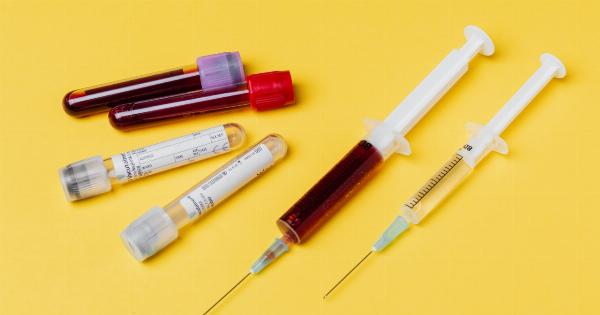It is common for doctors to order blood tests to diagnose diseases, monitor the effectiveness of the treatment, or even identify undiagnosed conditions.
Blood tests can provide valuable insights into the body’s functioning, but their accuracy can be influenced by various factors. In this article, we will explore various factors that can affect the results of blood tests.
: Age and Sex
Age and sex can influence the results of many blood tests. For instance, the levels of hormones, enzymes, and proteins can differ based on age and sex.
Women have higher levels of certain types of lipoproteins than men, which can affect the accuracy of cholesterol tests. Similarly, the levels of prostate-specific antigen (PSA) in men can vary based on age and ethnicity, leading to false positives or negatives, which can affect the diagnosis of prostate cancer.
: Diet
Diet can significantly affect the results of blood tests. Fasting before a blood test is essential for accurate results for many tests, such as blood glucose or cholesterol tests.
Consuming food or beverages, especially high-fat foods, can raise triglycerides levels, leading to false positives in cholesterol tests. Similarly, taking vitamin supplements or herbal remedies can produce false-positive or negative results in various blood tests, including liver function tests and thyroid tests.
: Medications
Medications can affect many types of blood tests. Some drugs, such as corticosteroids and anticonvulsants, can increase liver enzymes, which can result in false-positive results in liver function tests.
Similarly, taking aspirin or nonsteroidal anti-inflammatory drugs (NSAIDs) can affect the results of platelet count tests. Some medications can also interfere with thyroid or hormone tests.
: Lifestyle factors
Lifestyle factors, such as smoking, drinking, and exercising, can affect blood test results. Smoking can increase the white blood cell count and reduce platelets count, leading to false-positive for various blood tests, including cancer markers.
Heavy drinking can cause liver damage and increase the liver enzymes, affecting liver function tests. Vigorous exercise can also raise certain enzymes levels, leading to false positives in tests that measure muscle or heart function.
: Dehydration
Dehydration can affect the accuracy of many blood tests. When the body is dehydrated, the blood becomes more concentrated, leading to increased levels of electrolytes, enzymes, and proteins.
This can result in false positives in kidney, liver, or electrolyte tests. Similarly, dehydration can affect blood glucose tests, as it can cause a rise in sugar levels in the bloodstream.
: Stress
Stress and anxiety can have a significant effect on blood test results. When the body is under stress, there is an increase in cortisol levels, which can affect glucose, cholesterol, and even thyroid tests.
Stress can also cause a rise in white blood cell count, leading to false positives in cancer marker tests. Therefore, it is essential to be calm and relaxed before going for a blood test.
: Genetics
Genetics can play a crucial role in determining the accuracy of blood tests. Some genetic factors can affect the levels of hormones, enzymes, and proteins in the body, leading to false positives or negatives.
For instance, genetic mutations can affect cholesterol or glucose metabolism, leading to anomalies in corresponding tests. Similarly, some ethnic groups have a higher risk of developing specific disorders, which can affect the accuracy of genetic tests.
: Medical conditions
Underlying medical conditions can also affect blood test results. Many diseases, such as diabetes, kidney disorders, and thyroid problems, can lead to changes in the levels of various blood components, leading to false positives or negatives.
Similarly, cancer, infections, or even pregnancy can affect the accuracy of blood tests for cancer markers, immune system, and hormone tests, respectively.
: Lab errors
Finally, lab errors can also affect blood test results. Mistakes during the collection, handling, or processing of blood samples can lead to erroneous results.
Similarly, the use of outdated or malfunctioning lab equipment can also lead to inaccurate results. Therefore, it is essential to ensure that the lab follows proper procedures and uses the latest equipment to avoid errors.
: Conclusion
Overall, blood tests can provide valuable insights into the body’s functioning, but their accuracy can be influenced by various factors.
Age, sex, diet, medications, lifestyle factors, dehydration, stress, genetics, medical conditions, and lab errors can all affect the results of blood tests. Therefore, it is crucial to follow the doctor’s instructions before going for a blood test and inform them about any medical conditions or medications that can affect the test results.































